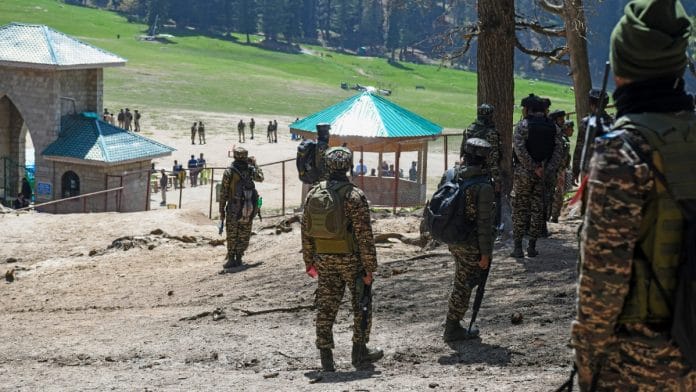New Delhi: A special court in Jammu has rejected a National Investigation Agency petition to conduct a polygraph test on two persons arrested by the agency on charges of providing food and logistics support to terrorists who carried out the 22 April attack in Pahalgam.
The application was junked 29 August after Bashir Ahmad Jothar and Parvaiz Ahmed refused to give consent for the tests before the court.
Bashir and Parvaiz, local ponywallahs in the Baisaran Valley, were arrested by the NIA 22 June this year.
The arrests came exactly two months after terrorists linked to Pakistan-based Lashkar-e-Taiba (LeT) killed 26 people, including one local, on 22 April, prompting India to launch Operation Sindoor against terror establishments and infrastructure inside Pakistan.
“Parvaiz and Bashir had knowingly harboured the three armed terrorists at a seasonal dhok (hut) at Hill Park before the attack, as per NIA investigations. The two men had provided food, shelter and logistical support to the terrorists, who had, on the fateful afternoon, selectively killed the tourists on the basis of their religious identity, making it one of the most gruesome terrorist attacks ever,” the NIA spokesperson had said after their arrest in June.
As part of the lie-detector test, doctors record several physiological signs such as heart rate, blood pressure, respiration, and skin conductivity, while the persons subjected to these tests answer questions. The test is based on the assumption that false responses to questions lead to physiological changes that are detectable on a polygraph.
Results of the lie-detector tests or polygraph tests are not admissible in court, but any findings or evidence recovered as a result of the procedure are admissible in court during trial proceedings.
Dismissing the petition filed by the NIA, Special NIA judge Sandeep Gandotra observed that conducting such scientific tests on the accused without their consent would amount to a violation of their rights against self-incrimination.
“In the humble opinion of this court, involuntary administration of scientific techniques such as narco-analysis, polygraph examination tests would violate the ‘right against self-incrimination’ enumerated in Article 20 (3) of the Constitution. This is because the underlying rationale of said right is to ensure the reliability as well as voluntariness of statements that are admitted as evidence. Invocations of a compelling public interest cannot justify the dilution of constitutional rights such as the ‘right against self-incrimination’,” Gandotra observed in the order.
The NIA, which sent its team to the site of the terrorist attack even as the Jammu and Kashmir Police launched the probe initially, filed the plea to get “precise and substantial” breakthroughs in the investigation.
In its application before the court, the agency had argued that the accused duo were “inconsistent” in their responses to various facets of the case and hence hampering the investigation.
The agency had also submitted that both the accused had volunteered for lie-detector tests. However, they told the court on 29 August that they were not willing for the tests.
“Today, both the accused persons have been produced before the undersigned in proper custody. It was inquired from them as to whether they understand Urdu language to which they replied in affirmative. The procedure for conducting polygraph/narco-analysis test was explained to them in the language they understand i.e. Urdu and they were asked as to whether they are willing to undergo polygraph/narco analysis test by their own free will and consent and without any undue influence,” judge Gandotra observed in the order.
“Both the accused persons have submitted in open court that they are not willing to undergo polygraph/ narco analysis test,” the judge added.
(Edited by Ajeet Tiwari)






